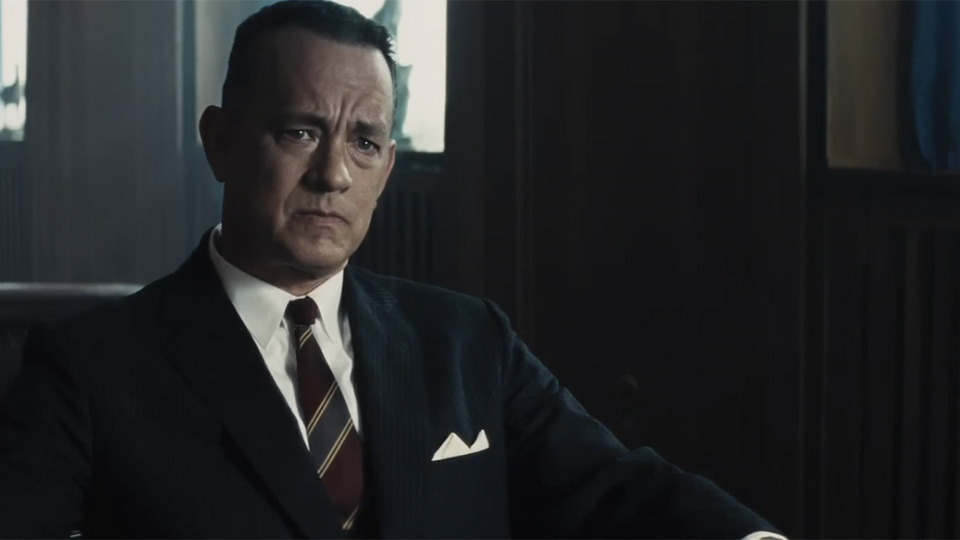Steven Spielberg has spoken out against Hollywood’s over-reliance on superhero flicks, when there are so many other ways to make a popular movie. It’s what he’s been doing since Jaws (1975), the film that put him on the map. Today the name ‘Spielberg’ is synonymous with a certain style of Hollywood entertainment – lavish, detail-perfect sets; music that provides all the emotional cues; sharp plotting, editing and continuity; and a peculiarly American sentimentality that makes one think of Frank Capra.
Bridge of Spies has all of these characteristics, but it may be the leanest, driest film Spielberg has ever made. This must be partly due to Joel and Ethan Coen, who have reworked a script by Matt Charman, adding some of the je-ne-sais-quoi of their own movies.
There are spy films that are no better than cartoons, as with most of the James Bond series, and others, such as The Spy Who Came in From the Cold (1965), that creep along in the shadows. Spielberg’s tale is firmly in the latter category, a low-key narrative with little overt action, in which tension builds by degrees. It is an almost exclusively masculine story without a love interest, a secret game played by men.
It begins in 1957, the height of the Cold War, when tensions between the United States and the Soviet Union were escalating. We watch a grey, sallow man, Rudolf Abel (Mark Rylance) painting a self-portrait in a cheap Manhattan hotel room. When he walks out into the street, FBI agents swarm like flies.
Soon Abel is arrested, and his trial becomes front page news. As a Russian spy he is widely expected to be convicted and executed, like the Rosenbergs. Yet because this is the Land of the Free, due process must be seen to be observed and a credible defence attorney appointed. That dubious honour falls on the shoulders of James B. Donovan (Tom Hanks) a New York insurance lawyer, who is pressured into taking the case as a matter of patriotic duty.
As this film is based on real events it’s worth noting that the real Donovan did defend Rudolf Abel, but only after a number of other lawyers refused. He was not quite as ignorant of military and intelligence matters as the Tom Hanks character because he had been an assistant at the Nuremberg Trials in 1945.
For the purposes of this story Donovan is transformed into a simple insurance lawyer whose fundamental belief in justice and the American Constitution prompts him to fight fiercely for his client’s rights, even though the judge, the media and the public consider the verdict a foregone conclusion.
A few years later, when an American pilot, Gary Powers (Austin Stowell) is shot down over Soviet air space and held captive, Donovan’s experience makes him the leading candidate to negotiate a swap of prisoners.
To undertake this top secret mission Donovan must travel to Berlin, telling his wife and family that he is going on a business trip to London. In fact he is plunging headlong into the world of espionage we know so well from the novels of John Le Carré and Len Deighton. In East Berlin, newly concealed behind a concrete wall, Donovan will meet the predictably sinister, enigmatic functionaries of the Communist powers.
The complication in his mission is that an American student, Frederic Pryor (Will Rogers) has got himself arrested by the East Germans. Against the advice of his CIA handlers, Donovan wants both Powers and Pryor in return for Abel. It’s the same two-for-one deal we’ve heard him discussing in relation to an insurance claim at the start of the film.
Donovan emerges as a man of rare integrity, unsullied by his foray into the murky world of international espionage. He is one of Spielberg’s true American heroes, the living embodiment of those values enshrined in the Constitution. He seems even more heroic for being a humble insurance lawyer rather than the experienced operator he was in real life, let alone a cartoon character in cape and leotards.
Hanks’s Donovan is an Everyman figure, with a wife and kids straight out of a TV sit com. There are moments when this portrait verges on parody, as we have to reconcile the character’s obvious sophistication with the same All-American traits that Hanks brought to his portrayals of Forrest Gump or Larry Crowne.
One can detect the hand of the Coen brothers in the way Donovan represents the ordinary man struggling to cope with extraordinary circumstances. Spielberg adds the moral dimension and the message. For although this is a film about the Cold War one thinks inevitably of the way political prisoners have been treated in the United States during the so-called War on Terror.
Rylance plays Abel in such a colourless fashion that it’s hard to reconcile his presence with the angry mobs of patriots baying for blood. Donovan sees his client as a good soldier who has merely done his duty, and this is the perception conveyed to the viewer. The emphasis is on a shared humanity, not political differences. In a war, even a Cold War, the combatants must behave honourably towards their opponents.
The Americans have a special obligation to act in a morally upright manner, because they are only too aware of the hypocrisy of the Soviet system. As with Lincoln, Spielberg has given us historical film in which we see an oblique but unmistakable reflection of the present.
Bridge of Spies
Directed by Steven Spielberg
Written by Matt Charman, Ethan & Joel Coen
Starring Tom Hanks, Mark Rylance, Alan Alda, Austin Stowell, Scott Shepherd, Amy Ryan
USA, rated M, 142 mins
Published in the Australian Financial Review, Saturday 24th October, 2015.

